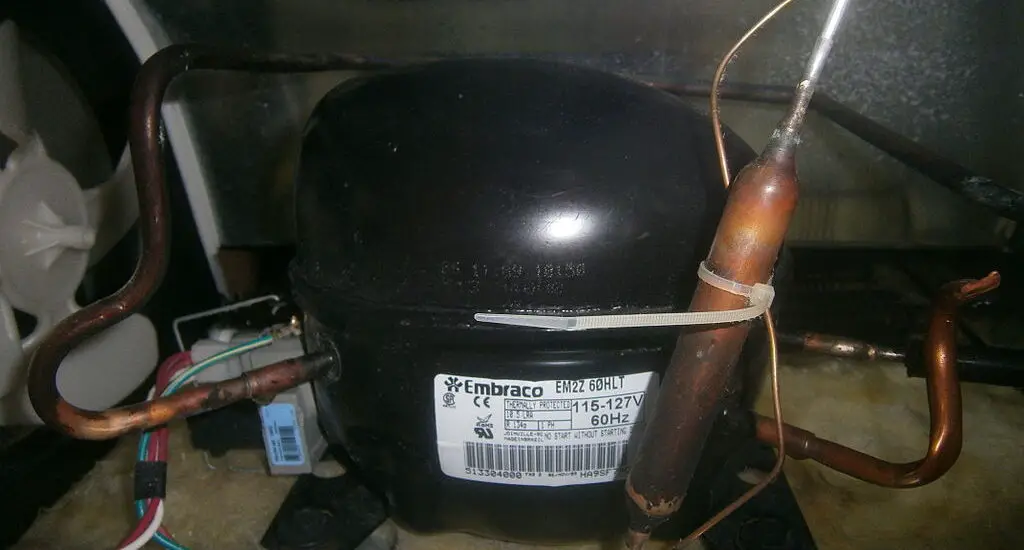If you’re dealing with a refrigerator compressor banging noise, this article offers a detailed, step-by-step guide to help you identify the cause and walk you through fixing the issue.

Table of Contents
Common Causes of Refrigerator Compressor Banging Noise
The noises coming from your refrigerator’s compressor can be due to various factors. Understanding the root causes can help you take the appropriate action:
Loose Parts: A refrigerator is a machine that runs constantly, which can result in natural wear and tear. Bolts, screws, and other internal components can become loose due to the appliance’s vibration. These loose parts can clash against each other or the body of the refrigerator, causing a banging noise.
Refrigerant Issues: The refrigerant is the substance that your refrigerator uses to keep things cold. However, if it is not circulating properly—perhaps due to a leak or blockage—the compressor can overwork. This overexertion can result in a banging or knocking noise as the compressor tries to maintain the necessary temperature.
Motor Problems: The motor is the part that drives the compressor. If the motor has worn-out bearings or is experiencing other issues, it may not run smoothly. These irregularities can cause the motor to produce a banging noise as it operates.
Steps to Diagnose the Refrigerator Compressor Banging Noise Issue
Proper diagnosis is crucial for effective resolution. Here are the step-by-step instructions to identify the problem:
Unplug the Refrigerator: This is the first and most critical step. Always unplug your refrigerator from the power source to prevent electrical shock before you start your investigation.
Locate the Compressor: The compressor is usually at the back of the refrigerator, enclosed in a metal or plastic casing. You may need to unscrew and remove this casing for better access.
Identify the Noise: Once you have access to the compressor, plug the refrigerator back in and listen carefully. Is the noise coming from the compressor itself, or perhaps a nearby component? This observation will guide your next steps.
Check for Loose Parts: If the noise appears to be mechanical, like something is hitting or rubbing, unplug the refrigerator again. Examine all screws, bolts, and other fixtures to ensure they are tight. Loose parts can often be the culprit.
How to Fix a Refrigerator Compressor Banging Noise
Once you’ve identified the issue, you can take the appropriate action to resolve it:
For Loose Parts: Use a screwdriver or a wrench (e.g. this Amazon-listed Crescent 4″ Adjustable Black Oxide Wrench – Carded) to tighten all loose screws, nuts, or bolts. Make sure you do not overtighten, as this can cause other problems.
For Refrigerant Issues: Issues with the refrigerant are complex and require professional intervention. The refrigerant is a controlled substance, and only qualified technicians can handle it. If you suspect this is the issue, call a certified technician to examine and repair your refrigerator.
For Motor Problems: A faulty or failing motor usually requires replacement. This is not a DIY job for most people, and it is recommended to consult a professional. A technician can properly diagnose and replace the motor if necessary.
Check out these other articles...
Refrigeration Compressor Capacity Control: Your Ultimate 411
Compressor Sweating: Your Complete Guide
Short Cycling of Refrigeration Compressor: Proven solutions
Refrigerator Compressor Always On: 4 Causes & Sure Fixes
Refrigerator Compressor Auto Cut Off: Your Ultimate Guide
When to Call a Professional
Despite your best efforts, some problems are beyond the scope of DIY fixes. If you’ve attempted the above steps and still hear a refrigerator compressor banging noise, call a certified technician. Procrastination could escalate the issue, leading to more costly repairs or even the need for a full refrigerator replacement.
